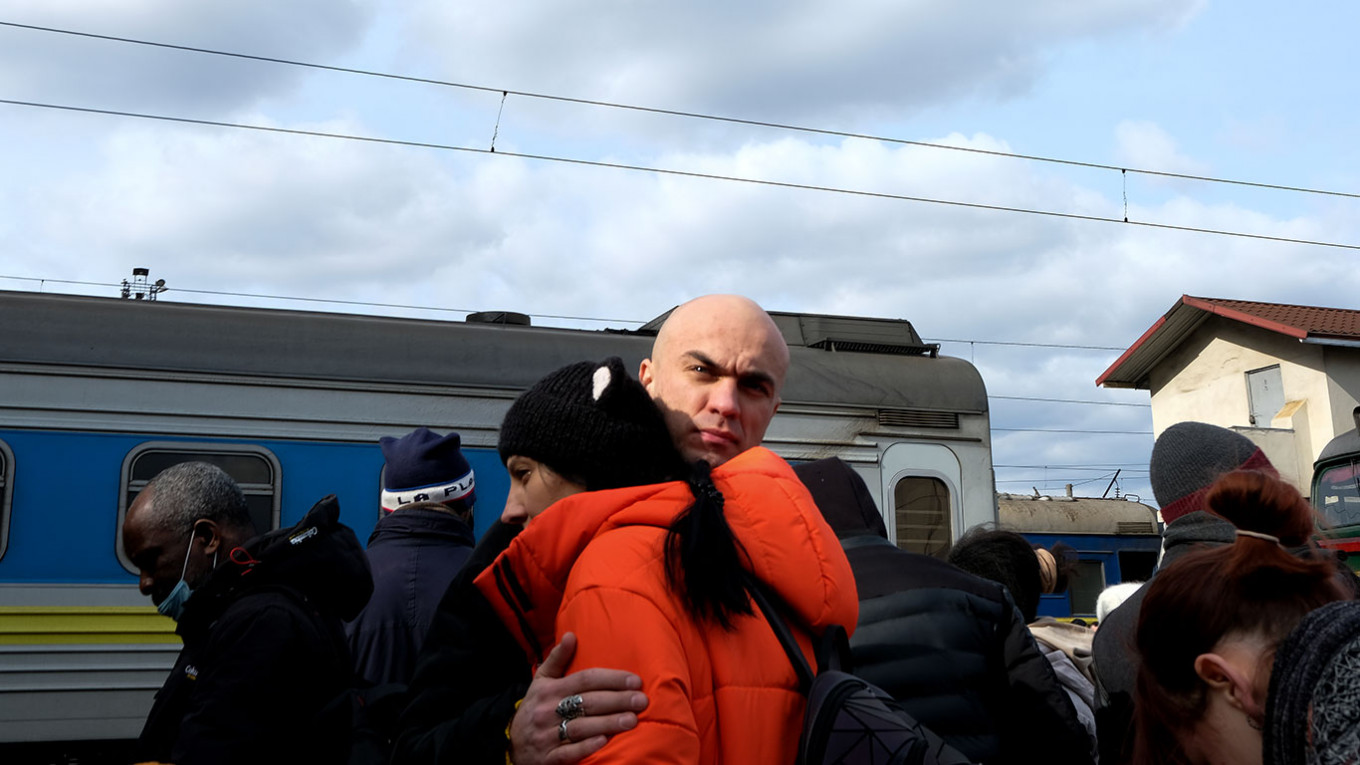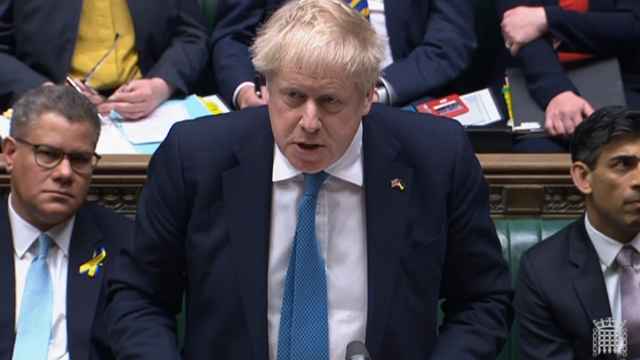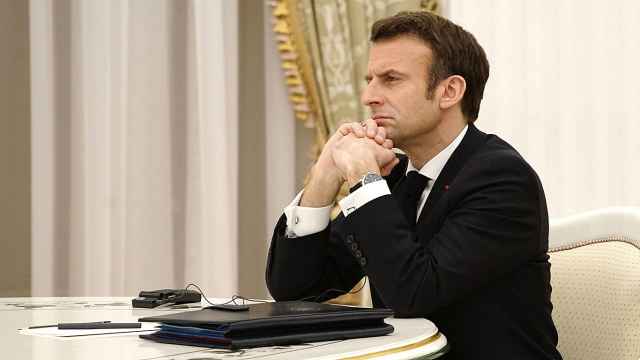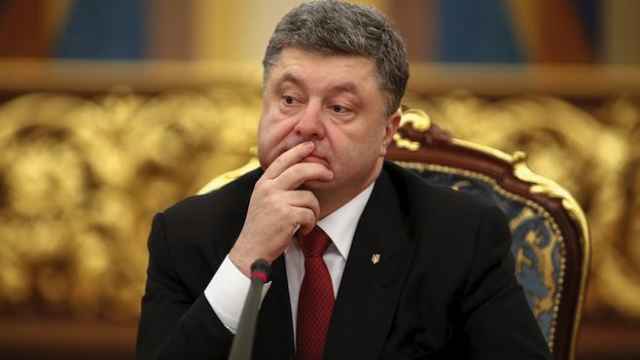As a loudspeaker announces that the 13:55 train from the Western Ukrainian city of Lviv across the border to Przemysl in Poland has been canceled, the weary crowd on the platform doesn’t budge, hoping for a miracle.
Not until an air raid shrieks through the elegant, Art Nouveau station do people run to the tunnel leading to the platform to shelter from a strike that never materializes, a few hundred of the estimated 500,000 so far displaced by Russia’s invasion of its neighbor Ukraine last week.
Khrystyna Mikhalyuk, 30, and her husband Valentyn, 33, fled Ukraine’s capital Kyiv with their young son the day after the attack, hoping to find a place to stay in Poland until it will be safe to return home.
“The streets there were empty, so we could go by foot to the station. While we were walking, there were explosions, sirens,” she said of their escape. “We kept going against our own fears and we were so glad to make it in the end. They were a hellish two days.”
With Ukrainian men between the ages of 18 and 60 banned from leaving the country and urged to join the country’s burgeoning Territorial Defense Forces, Valentyn plans only to escort his family to safety in Poland before returning to his parents in Cherkasy, 200 kilometers south of Kyiv.
War has not yet come to Lviv. Air raid sirens sound daily, sending citizens running to their local bomb shelters, but a first strike on the city located around 70 km from the Polish border has yet to be recorded.
With Russia’s plans to take Ukraine’s eastern cities looking increasingly set for the long haul, and most scenarios excluding an occupation of western Ukraine anyway, the historical and modern heartland of Ukrainian nationalism may emerge from the war completely unscathed. With most but not all shops and restaurants closed, the atmosphere in Lviv’s charming Habsburg-era old town evokes the early months of the pandemic rather than a war zone.
The city’s railway station, however, is becoming a transfer hub for what could become the greatest movement of refugees Europe has seen in decades, with over 115,000 people having already crossed the Polish border alone, and many more to come.
Along with other regional capitals, Ukraine’s two biggest cities, Kyiv and Kharkiv, have seen Russian troop incursions and bombing since the war began on Thursday. Though the capital is now under strict, round-the-clock curfew, special evacuation trains have continued to head west from both cities, full of civilians escaping the fighting.
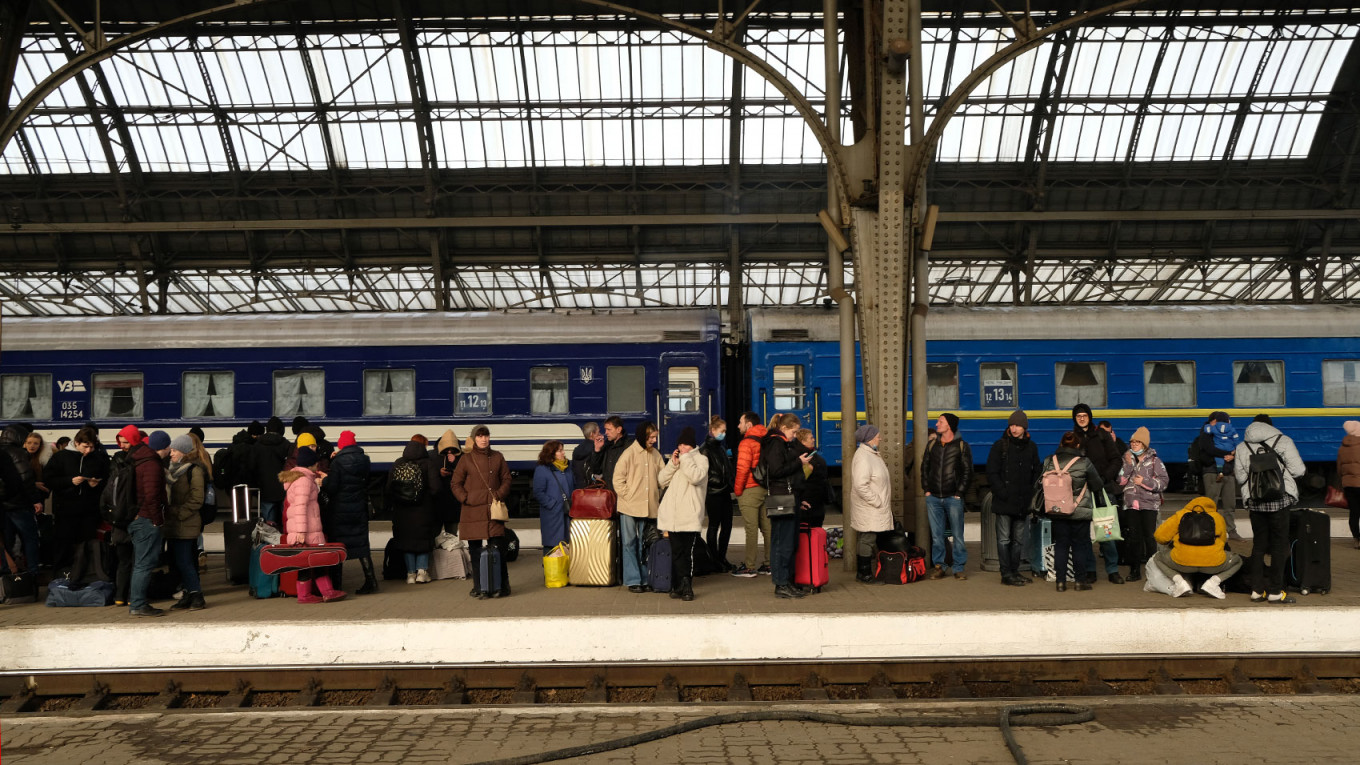
One-by-one, the trains arrive in Lviv. Photos and videos posted online show scenes of chaos and packed platforms every night.
Relative calm descends each morning. Some refugees head into town for supplies, while some simply take in the fresh air. The many house pets taken on the journey are slowly getting to know each other, though they don’t always get along.
Dasha, 9, traveled with her mother on the same train from Kyiv as Khrystyna and Valentyn. Eager to share, Dasha described her ordeal with pronounced calm.
“After the first sirens, there were plenty of explosions, but I wasn’t even afraid,” she said. “I’m already over it.”
On the fight for Ukraine, Dasha was more somber. “The way I see it, Putin just wants to overthrow our government, to subdue us so that we are all his slaves,” she said.
As another round of sirens dies down, Andrei Gorobenko, 28, stands smoking on the square in front of the station with two new friends he met on the train from Kyiv. Again, as with most of the arrivals from Kyiv, his story is one of blasts, bomb shelters, and backpacks.
“Yesterday, I started hearing explosions for the first time, and soon they just started getting closer and closer. I saw that there was a late night train going for free, closed my flat, grabbed my backpack, and left,” he said.
Practically all of the arrivals from Kyiv have friends and family who chose to stay in the besieged capital. “What’s their mood? They’re all waiting for victory,” said Andrei of his friends who stayed.
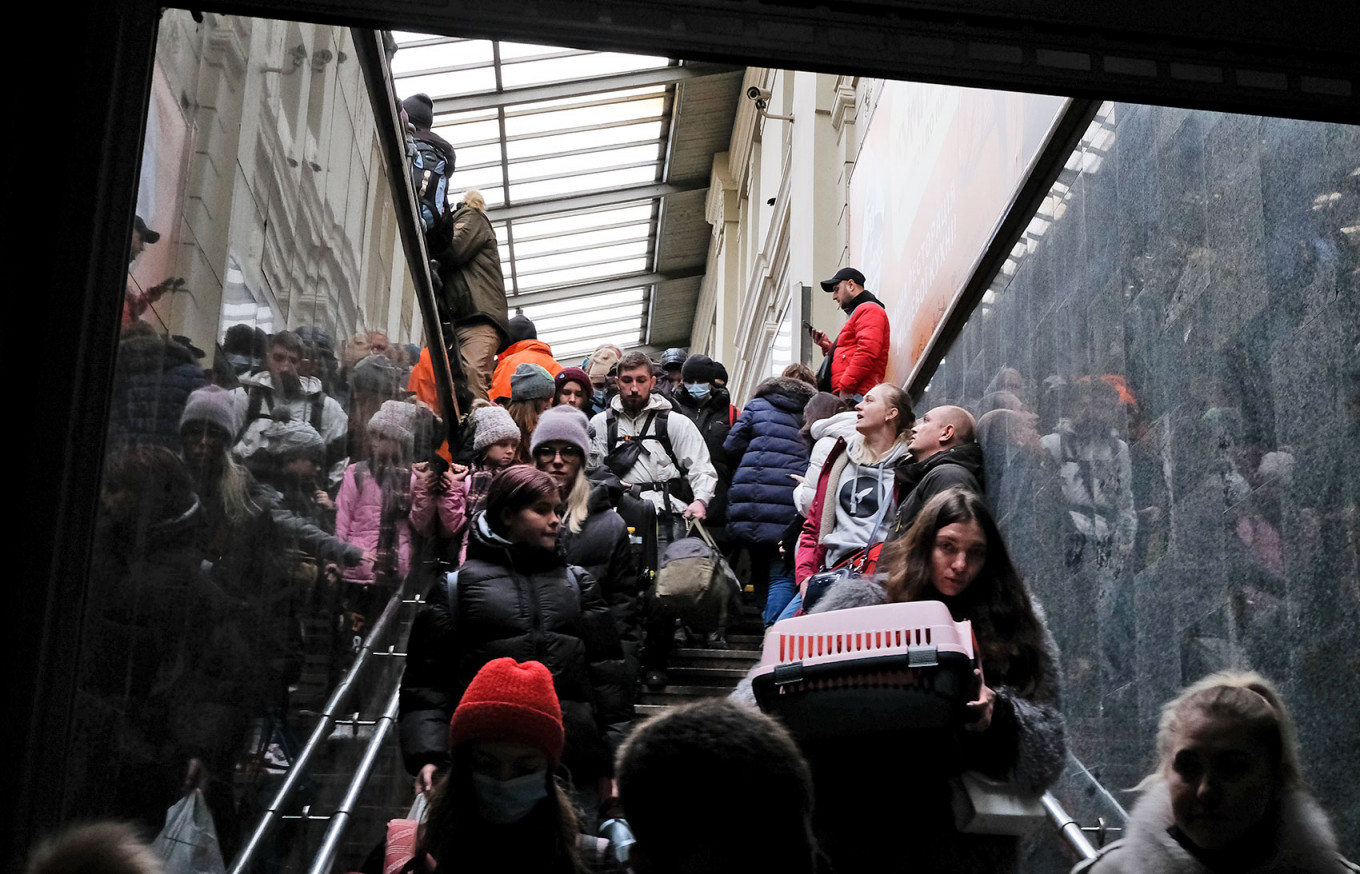
Stoic smiles
Rita Yevlenta, a 25-year-old temporary worker from Poltava, was in an upbeat mood, not only about crossing the border, but about the fate of the war.
“Our soldiers would wave at us from their vehicles as they passed, as if saying ‘everything will be alright,’ it was really cool,” she said.
Stoic smiles, however, aren’t enough to deal with the surreal upheaval the refugees have faced in leaving a war-torn European capital.
“I still don’t really believe that all this has actually happened,” Yevlenta added. “War in 2022 … I haven’t yet processed that this is reality, that it’s not just a bad dream.”
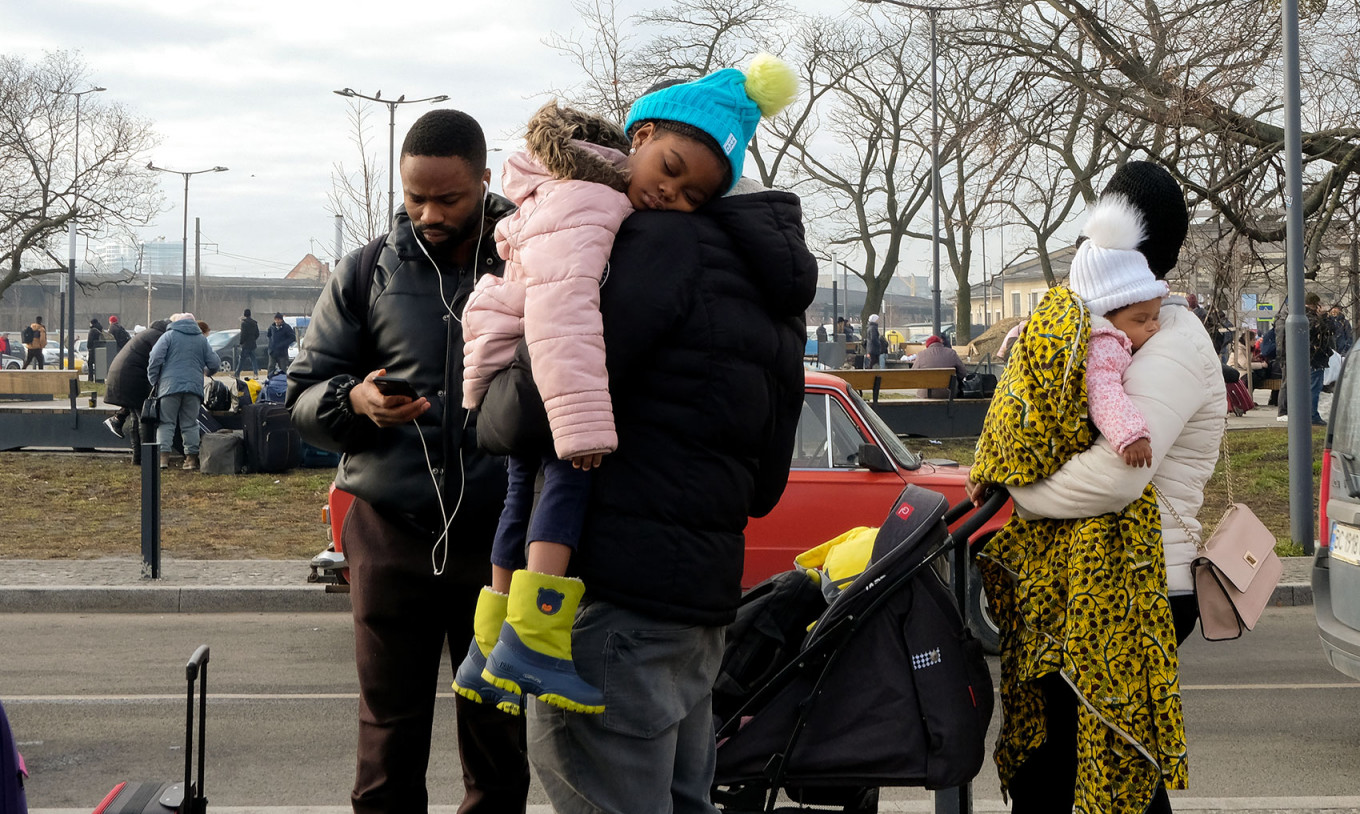
A large portion of the refugees in Lviv are foreign university students from Africa, India, and the Middle East. Reports have come from the border of non-Ukrainians being discriminated against, threatened, segregated and in many cases denied either exit from Ukraine or entry into Poland.
Unlike the migrants who attempted to enter Poland from Belarus last autumn, these students have already spent several years in Ukraine, invested much into a Ukrainian medical or engineering degree and learned the local language.
Joris, a 23-year-old from Côte d'Ivoire who asked for his surname to be withheld, was among a small group of engineering students hoping to make it to Poland.
“Of course I want to come back to Ukraine when the war is over,” he said of his plans. “I am three months away from graduating!”
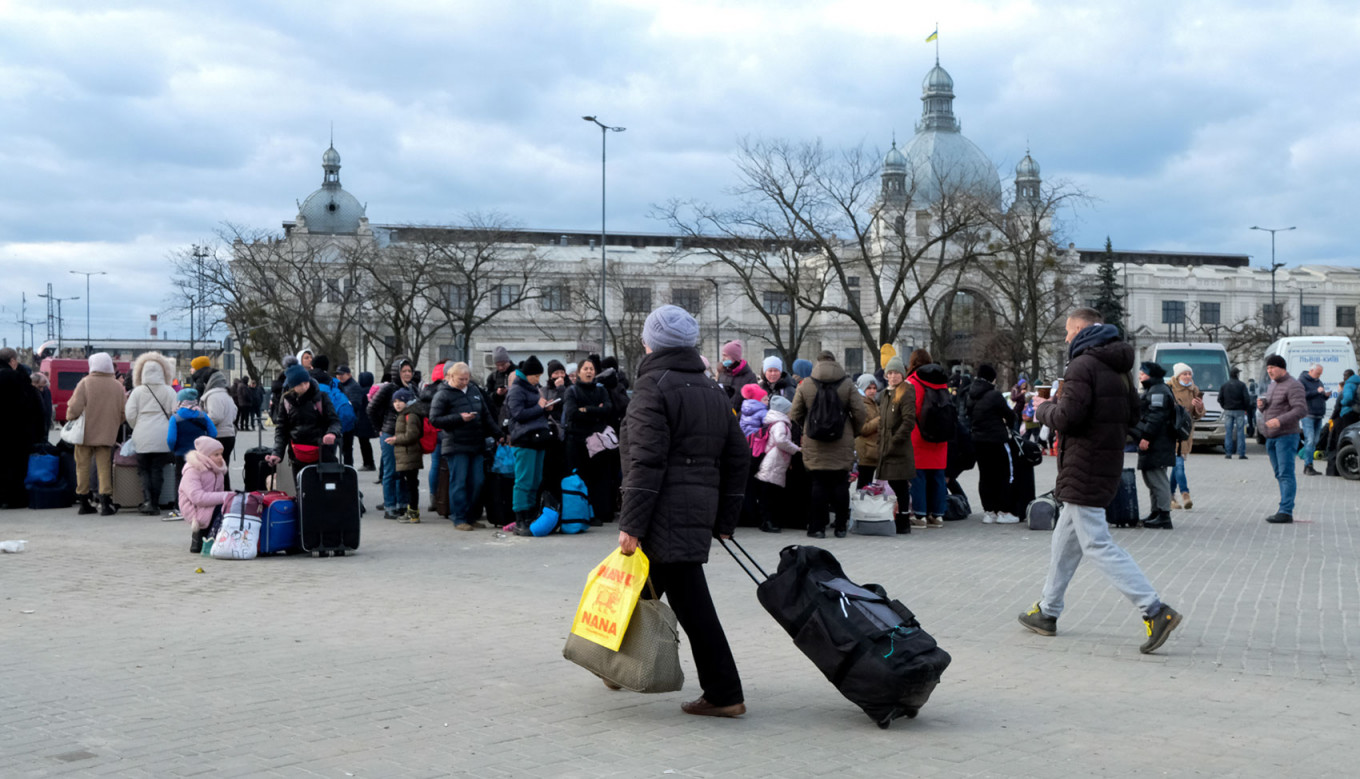
For those who choose not to make the onward journey to the border by train, a fleet of assorted buses and minivans stands waiting. People negotiate with the driver on the spot in a low-supply and high-demand market.
As the afternoon wears on, the square in front of the station begins to empty of its crowds, at least until the next trainload of refugees arrives.
The following evening, Valentyn sent a text saying his family didn’t make it onto the train to Poland because of the intense pushing and shoving on the platform. After a long journey by taxi to a different border post and a night spent in a local village, Khrystyna and their son finally crossed without him.
A Message from The Moscow Times:
Dear readers,
We are facing unprecedented challenges. Russia's Prosecutor General's Office has designated The Moscow Times as an "undesirable" organization, criminalizing our work and putting our staff at risk of prosecution. This follows our earlier unjust labeling as a "foreign agent."
These actions are direct attempts to silence independent journalism in Russia. The authorities claim our work "discredits the decisions of the Russian leadership." We see things differently: we strive to provide accurate, unbiased reporting on Russia.
We, the journalists of The Moscow Times, refuse to be silenced. But to continue our work, we need your help.
Your support, no matter how small, makes a world of difference. If you can, please support us monthly starting from just $2. It's quick to set up, and every contribution makes a significant impact.
By supporting The Moscow Times, you're defending open, independent journalism in the face of repression. Thank you for standing with us.
Remind me later.


